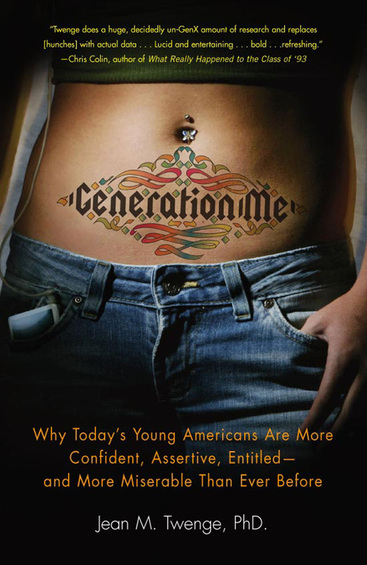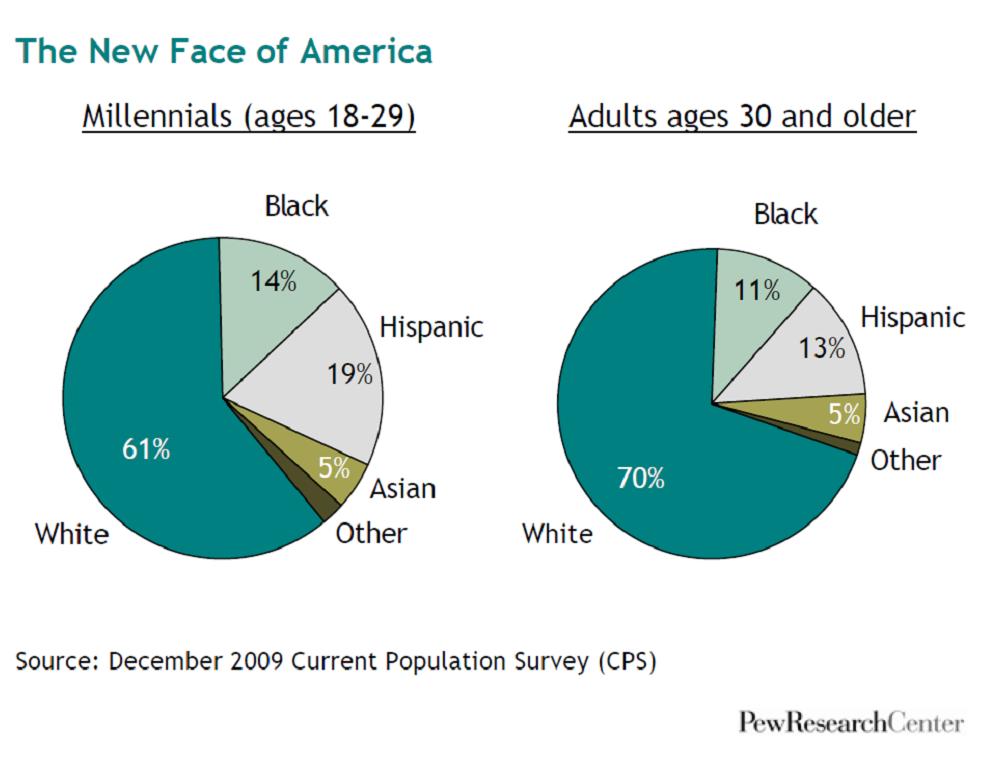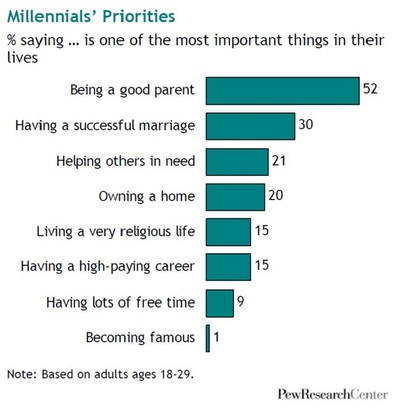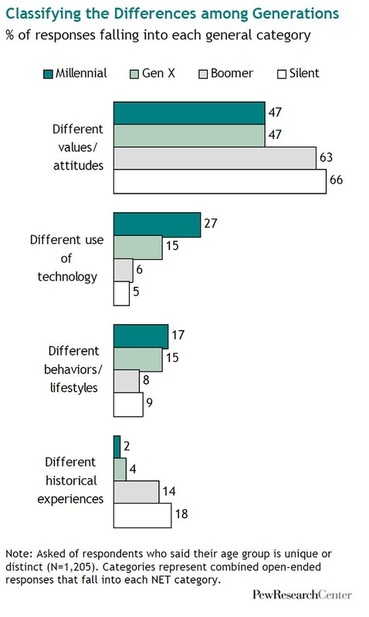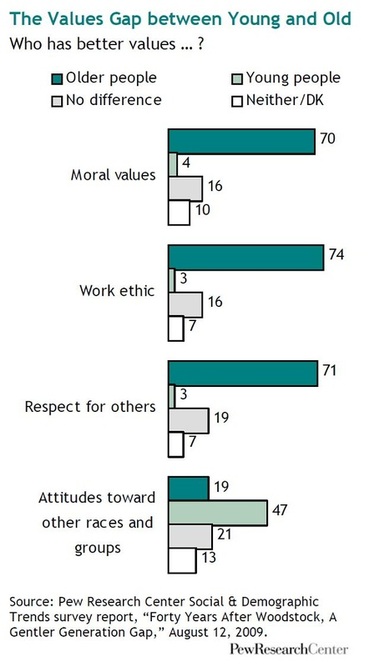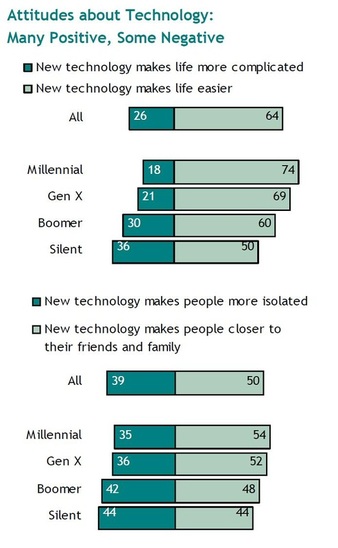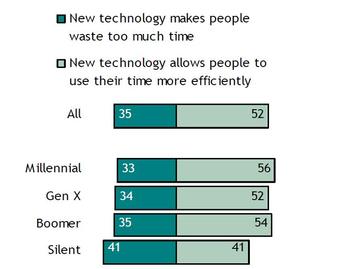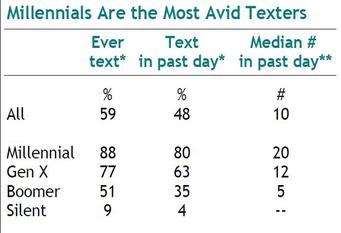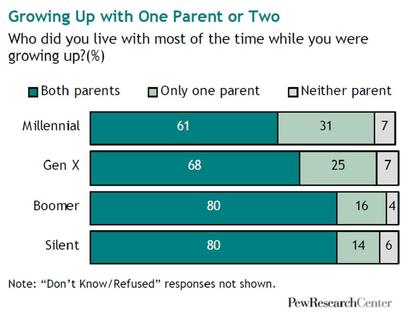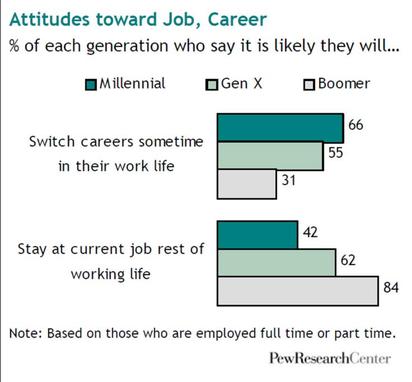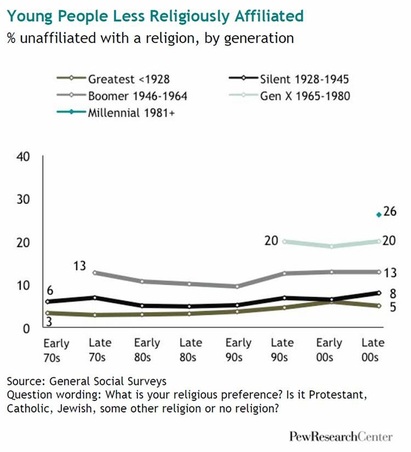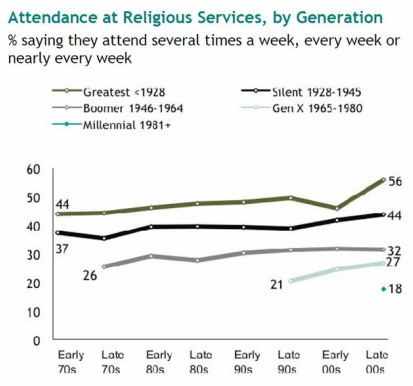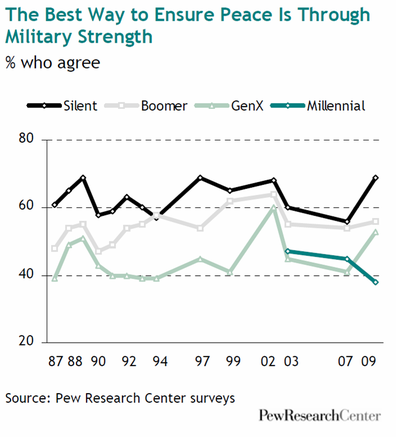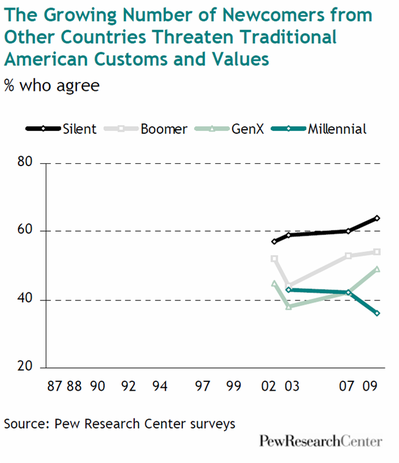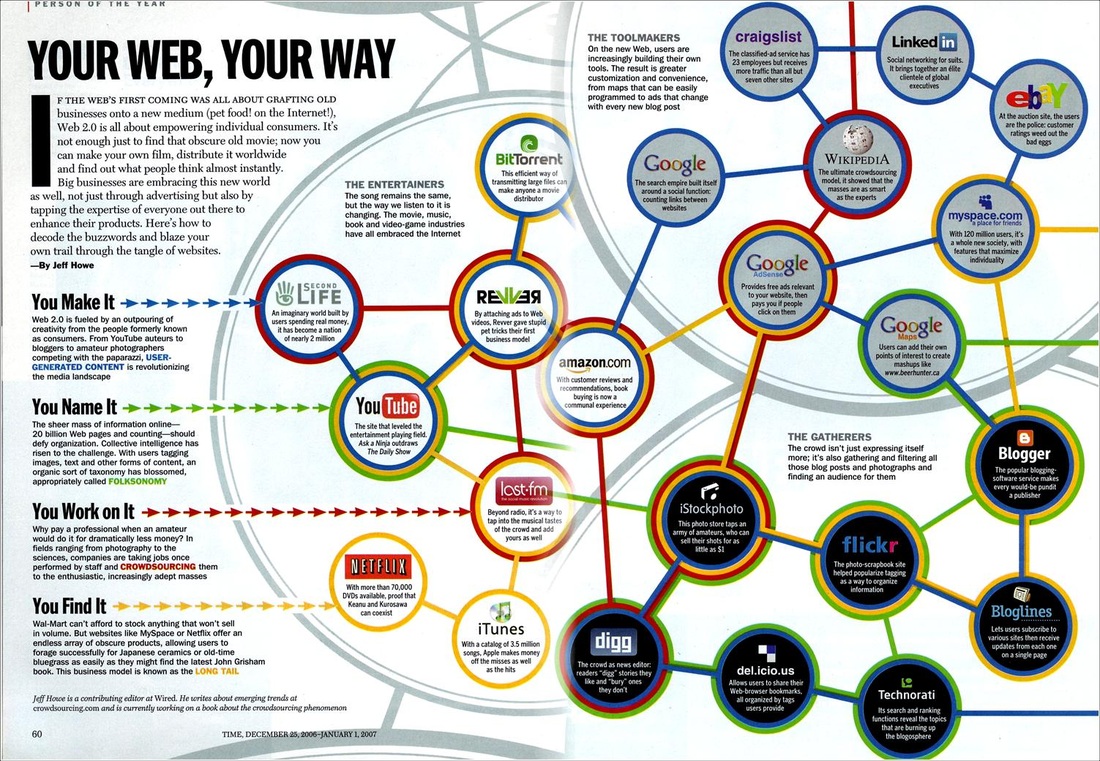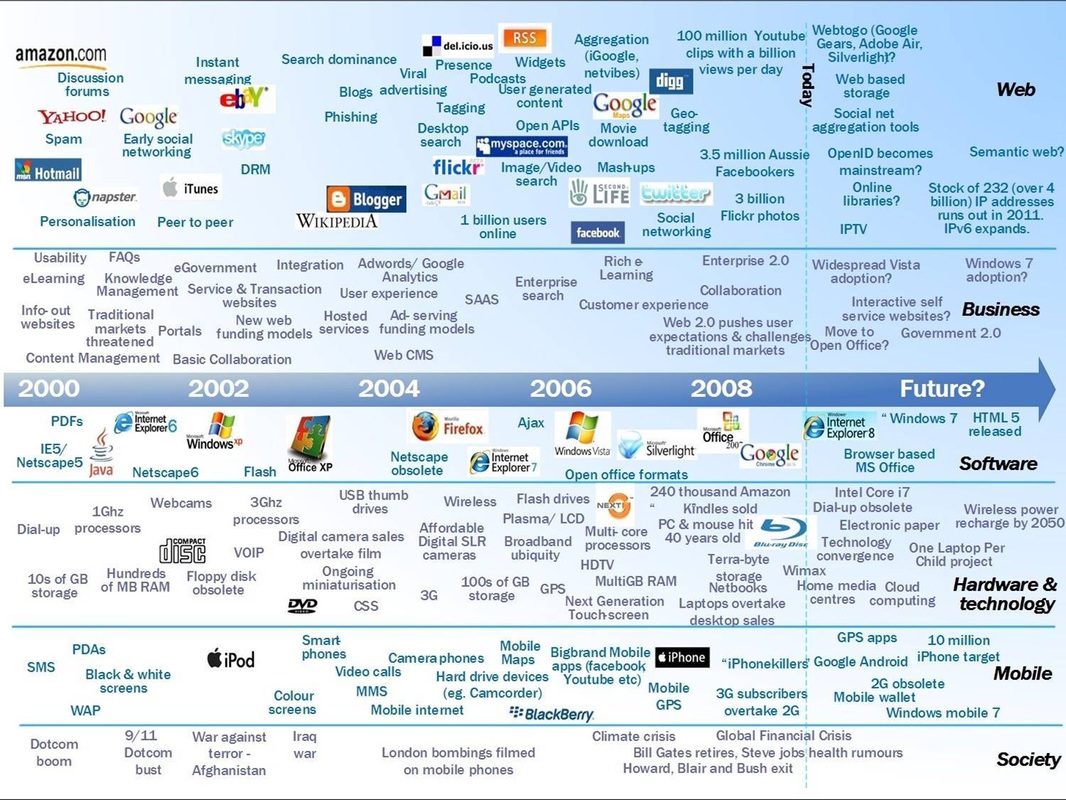GENERATION ME
Generation Me, written by Jean Twenge, is a landmark study about how youth and adolescents, born in 1981 to the present, are a part of the “Generation Me”, a generation very different from the previous generations, “Y” and “X”, and extraordinarily different from their parents’ generation (“Baby Boomers”) and the Silent Generation of their grandparents. But how to they (we...) differ? In what areas do we differ most? Are these differences good? or bad? or neither? but rather, a sign that each generation differs from the past?
Using primary source from Twenge’s book, answer the questions below. Note: Twenge and the date you see from the PEW Research Center will often refer to “GenME” as “Millennials.” They are the same term.
Using primary source from Twenge’s book, answer the questions below. Note: Twenge and the date you see from the PEW Research Center will often refer to “GenME” as “Millennials.” They are the same term.
1. Let’s start with the basics. Using the pie charts above, define the “GenME” (aka. “Millennials”) in terms of race and ethnicity. Secondly, what ethnic minority has the largest gap percentage between “GenME youth” and adults over 30. What kinds of problems will this create?
- Twenge says that “[Generation Me] are a much more informal and accepting society than [they] once were” (pg. 18). As a result of changing social mores, the rules that once governed polite society are no longer as strict, or universally accepted as they were for past generations. “Compared to Boomers . . . GenMe is twice as likely to agree with the statement, There is no single right way to live” (pg. 19).
2. In examining the graphs above, let’s expand on this “changing social mores” conversation. A “more” (pronounced “mor-AY”) is a socially-accepted way of doings things. To someone from GenME, what are the most important things in life? Furthermore, what makes someone from GenME different or unique from someone from a previous generation, for example, the “Boomer” or “Silent Generation”?
- Twenge says that, “[GenME] has not embraced the rules of etiquette that are built around 'respect for other people’s comfort'" (pg. 26). Cheating in school has increased (pg. 27). Students are less likely to recognize the authority of teachers, presuming instead that their perspectives and opinions are on an equal footing with the experts (pg. 29). Former taboos regarding dating and marriage have evaporated (pg. 31). GenMe individuals are more willing to share their experiences (positive and negative) in explicit detail with anyone who will listen (pg. 37). Language that was considered profane has become commonplace”(pg. 40).
3. This seems to be one of the biggest complaints about the “new generation”: that they lack manners and feel entitled for no apparent reasons. In examining the graphs above, where do the “GenMe” differ most from the previous generations in terms of behavior and values. More importantly, though...is this true for you? If yes, why? If not, why?
Let’s talk about confidence now. One of the biggest things that Twenge states is that GenME has an unbelievable amount of self-confidence, whether that “confidence” is earned or whether it’s not. She says:
- “...one of the primary contributors to this culture of the individual is the institutionalized emphasis on self-esteem that began in the 1970s. The self-esteem curriculum that took hold in schools and churches drove home to GenMe children that they are unique and special individuals, independent of anything they do or have." Twenge contends that this emphasis went overboard with GenMe, creating the belief that “feeling good about yourself is more important than good performance” (pg 56-57). A negative outcome of the overemphasis on self-esteem has been an increase in narcissism (pg 69), in which individuals are “overly focused on themselves and lack empathy for others” (pg. 68). An extension of the emphasis on self esteem, has been the message that “You can be anything you want to be” (pg 72). Twenge notes “We expect our kids to have individual preferences and would never dream, as earlier generations did, of making every single decision for our children and asking them to be seen and not heard. Not coincidentally, this also teaches children that their wants are the most important” (pg. 75). Twenge references a number of statistics and publications that indicate that GenMe students have very high expectations for the academic, professional and economic heights to which they aspire, and then illustrates that many of these confident expectations will be frustrated by simple realities.
4. According to Twenge, why is this generation, and Gen Y as well, so confident?
5. Furthermore, is this confidence “healthy”? What are the dangers of the confidence of today’s youth?
5. Furthermore, is this confidence “healthy”? What are the dangers of the confidence of today’s youth?
We already know that “technology” has given today’s youth a huge sense of pride, confidence, and, in certain cases, narcissism. How does technology affect our youth? Examine the data below.
What statements about technology, as seen in the data above, jump out at you most? What effect does this have on “confidence”?
Then there is the issue of lifestyle. Today’s youth are not the youth of yesterday. Consider a few data examples:
7. In your opinion, why are today’s youth born to more single parents than ever before?
8. What is the biggest change in the “career” category, as seen with GenME?
9. Young people are less affiliated with religion. Why? If you ARE affiliated with religion, tell me why. And if you’re NOT, tell me why.
8. What is the biggest change in the “career” category, as seen with GenME?
9. Young people are less affiliated with religion. Why? If you ARE affiliated with religion, tell me why. And if you’re NOT, tell me why.
- In regards to religion, Twenge says that, “GenMe is also less willing to follow the rules of organized religion” (pg. 34). She notes declining church attendance since the 1950’s, and particularly low attendance percentages for 18= to 29-year-olds. Twenge references Jeffery Arnett from Emerging Adulthood, describing “the belief systems of young people as ‘highly individualized’, which he calls ‘make your own ’religions.’ He found that only 23% of young people are ‘conservative believers’; the remaining 77% were agnostic/atheist, deist, or liberal believers (who believe in a religion but question some aspects of it)” (pg. 34). The churches that have experienced growth are those that “promote a very personalized form of religion” (pg. 35). These churches’ emphasis on Christ as a personal savior who has a plan for your life play into the individualized culture of GenMe. As an example, Twenge quotes Rich Warren from The Purpose-Driven Life, “Accept yourself. Don’t chase after other people’s approval . . . God accepts us unconditionally, and in His view we are all precious and priceless” (pg. 35).
10. What rationale does Twenge over for why more of GenME are not “conservatively religious”?
And lastly there’s the issue of politics. Examine the data below.
11. Where does GenME differ the most in terms of politics or world view? Why do you think this is so?
GenME as a Case Study
So, the data is quite clear that this generation is different: technology has yielded an overwhelming amount of information, available at the touch of a button. Members of the GenME generation are more confident, have different life priorities than those of the previous generations, and overall, see the world as theirs to mold, and not simply a world in which to live.
But what effect does this have on the generation that is so “me-centered”? Twenge discusses the “price of admission” is an overwhelming sense of depression, and ironically, isolation:
But what effect does this have on the generation that is so “me-centered”? Twenge discusses the “price of admission” is an overwhelming sense of depression, and ironically, isolation:
- “Our growing tendency to put the self first leads to unparalleled freedom, but it also creates an enormous amount of pressure on us to stand alone. This is the downside of the focus on the self – when we are fiercely independent and self-sufficient, our disappointments loom large because we have nothing else to focus on. But it’s not just us: Generation Me has been taught to expect more out of life at the very time when good jobs and nice houses are increasingly difficult to obtain. All too often the result is crippling anxiety and crushing depression” (pg 109).
12. According to Twenge, what is the reason for this depression? Has this been true for you? If so, please provide an example.
A “case study” is a closer examination of a subject, usually with primary source examples. Therefore, we’re going to use YOU as a representative of GenME and see if the data matches up.
13. Firstly, how “GenME” are you? Take the PEW Research Quiz to find out, and record your score. The link is here: http://pewresearch.org/millennials/quiz/
Secondly, let’s define a few of the reasons you yourself are part of GenME. Below is a graphic from TIME Magazine’s Person of the Year in 2006...which, interestingly enough, happened to be YOU!
14. Examine the graph below, paying close attention to the colors and linkages that indicate the category of “social connectivity” of each media tool. Choose five (5) of these media tools, and tell me either, 1) why you DO use it, or 2) why you DON’T use it.
After this, look at this graphic of social and media technology that has exploded onto the digital scene in the past decade.
15. As a point of analysis, choose a year in which you think “GenME” found its greatest identity. In other words, as a member of this generation, which year closest defined you, for the tools you use, the media you share, and connections you make. Why?
And lastly, we’ll conclude our case study here. Let’s recap what Twenge says about “GenME” using snippets of quotes from her book.
- - -
GenME is: “twice as likely to agree with the statement, There is no single right way to live”...
GenME is: “more willing to share their experiences (positive and negative) in explicit detail with anyone who will listen”...
GenME believes that: “feeling good about yourself is more important than good performance”...
GenME is: “[so] fiercely independent and self-sufficient, [that their] disappointments loom large because [they] have nothing else to focus on”...
- - -
Now, I want you to use the greatest case study-tool of all: Facebook. Log on to your Facebook account (if you have one...if you don’t, use someone else’s...), and find examples that illustrate one of the four quotes detailed above. DO NOT use their names, make light of their problems, or in any way poke fun at this. BUT! It is important that we find “real life data” according to Ms. Twenge’s theory. With your Facebook friends, can you find four real-life examples that prove the above quotes to be true? Write down the examples, using anonymity and compassion, and be ready to draw final conclusions back in class. Use the following template to get you started:
GenME Example 1: “A friend of mine posted how upset she was that her parents took the car away for the weekend.”
GenME Example 2: “A friend of mine wished happy anniversary to his girlfriend on her Facebook wall, and it make me wanna hurl cuz it was so disgustingly mushy...”
Have fun!
- - -
GenME is: “twice as likely to agree with the statement, There is no single right way to live”...
GenME is: “more willing to share their experiences (positive and negative) in explicit detail with anyone who will listen”...
GenME believes that: “feeling good about yourself is more important than good performance”...
GenME is: “[so] fiercely independent and self-sufficient, [that their] disappointments loom large because [they] have nothing else to focus on”...
- - -
Now, I want you to use the greatest case study-tool of all: Facebook. Log on to your Facebook account (if you have one...if you don’t, use someone else’s...), and find examples that illustrate one of the four quotes detailed above. DO NOT use their names, make light of their problems, or in any way poke fun at this. BUT! It is important that we find “real life data” according to Ms. Twenge’s theory. With your Facebook friends, can you find four real-life examples that prove the above quotes to be true? Write down the examples, using anonymity and compassion, and be ready to draw final conclusions back in class. Use the following template to get you started:
GenME Example 1: “A friend of mine posted how upset she was that her parents took the car away for the weekend.”
GenME Example 2: “A friend of mine wished happy anniversary to his girlfriend on her Facebook wall, and it make me wanna hurl cuz it was so disgustingly mushy...”
Have fun!
